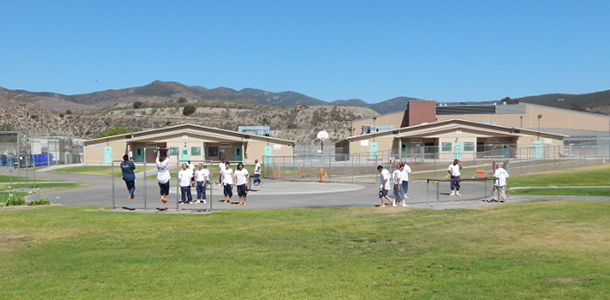
East Mesa Reentry Facility in San Diego (Photo Credit: CA Board of State and Community Corrections)
Stable employment is one factor that can help an individual successfully transition from jail back into the community. Unfortunately, many who are released from jail have few job skills or are in need of resources to find a stable job. A new program in San Diego will provide those resources in an effort to reduce jail recurrence.
Earlier this year, San Diego Workforce Partnership (SDWP) opened an America's Job Center of California (AJCC) branch in the East Mesa Reentry Facility. The goal of the center is to work with 600 individuals on pre- and post-release employment services, which will make them more employable and less likely to recidivate.
The career center is part of SDWP’s Reentry Works San Diego program, which is a partnership between SDWP, the San Diego County Sheriff’s and Probation departments.
“I think employment and recidivism are at an intersection where activities and interventions really can meet to improve outcomes in both regards,” said SDWP’s Director of Adult Programs Andrew Picard. “The goal is to improve outcomes in employment, which is our focus at the Workforce Partnership, as well as improve outcomes in recidivism by aligning corrections (public agencies) and workforce development agencies. If we can put them together, we can really improve on the goals and impacts of our agencies.”
The job center is funded by the U.S. Department of Labor’s Linking to Employment Activities Pre-release (LEAP) initiative, which funds jail-based employment centers in 20 communities across the country with the goal of reducing recidivism.
SDWP enlisted the services of Second Chance as the on-site service provider. Second Chance is a non-profit that helps people transform their lives through programs that provide job readiness and life skills training along with job placement, mental health and prisoner re-entry services, relapse prevention and sober-living housing for adults and youth in need.
Before opening the center, Second Chance held focus groups within the reentry facility to find out how to best serve the population. As a result, the career center has a computer lab with career pathway information and employment resources. Participants will also receive case management services, attend workshops and have access to business attire for inmates to wear during mock interviews with their peers and actual interviews at employer job fairs within the facility.
“I think the workforce partnership really reflects a philosophy in meeting people where they are and not expecting that our hardest-to-reach customers are always going to come through the doors of our job centers, but really targeting our job training programs to meet individuals most in need, like the justice-involved, where they’re at, so we can see more successful outcomes,” said Picard.
The SDWP career center is an example of how providing cost-effective programs in jail can reduce recurrence. Last month, CA Fwd’s Justice System Change Initiative (J-SCI) team presented several recommendations to neighboring Riverside County as part of an effort to reduce their recidivism rates, one of which is to provide jail programs targeted to reduce recurrence. The recommendations were approved unanimously by the Board of Supervisors.
According to Picard, the community — both inside the corrections world and outside of it — is supportive of this program and seeing more value in others like it that target recidivism.
“I think that we have in recent years slowly seen a shift where you have more employers now who are willing to openly say and are proud to say that they want to work with this population and give this population a chance,” said Picard.

